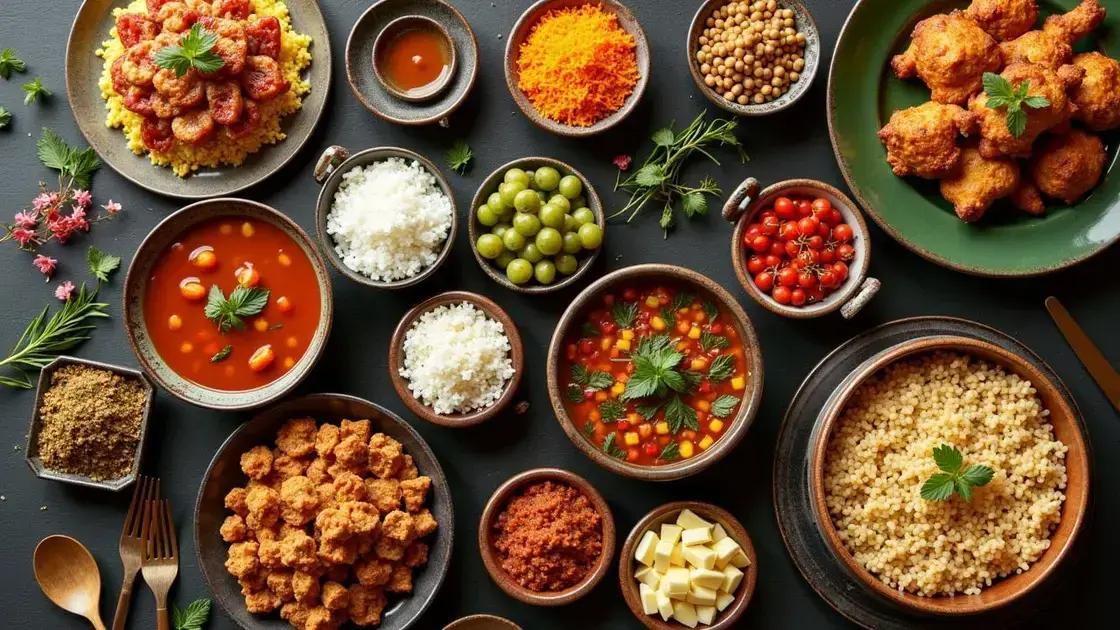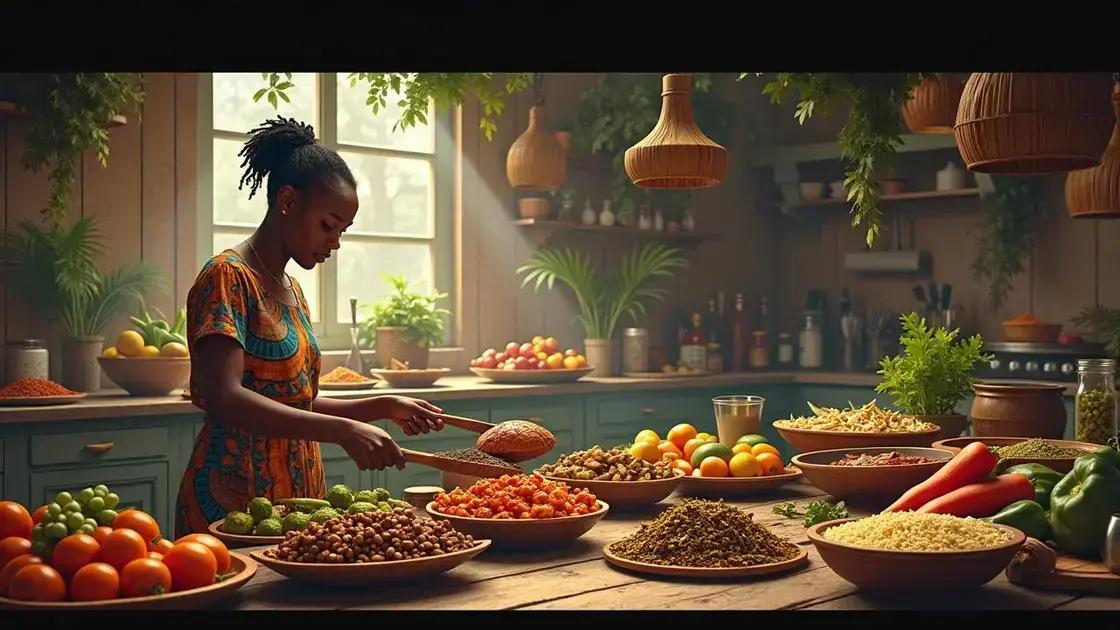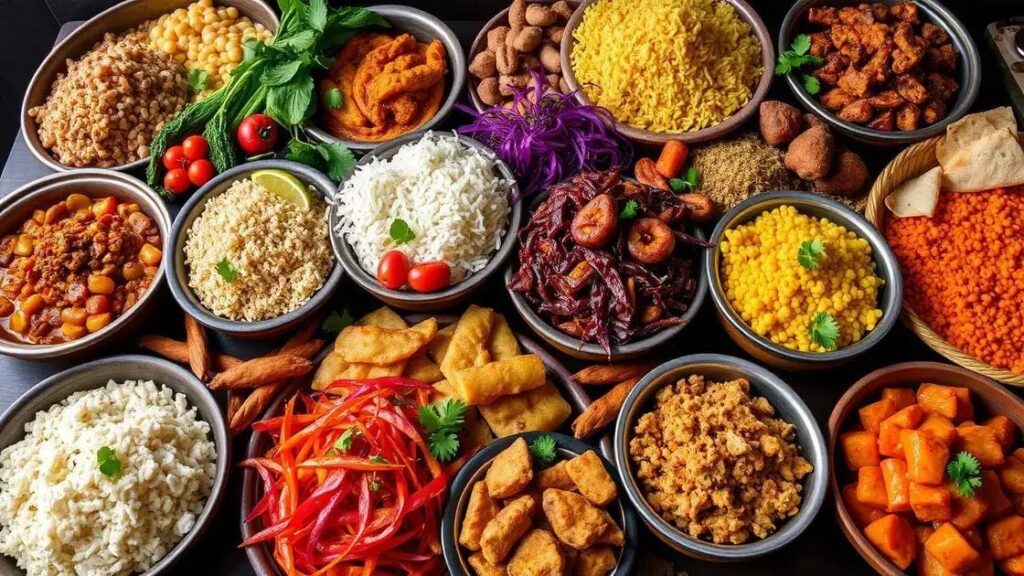The African recipe embodies a rich culinary tradition filled with diverse flavors, ingredients, and cooking techniques. From the spicy stews of North Africa to the hearty grains of West Africa, preparing these traditional dishes involves using staple ingredients and communal cooking practices, making them a celebration of culture and community.
The African recipe encapsulates a rich tapestry of cultural influences and culinary techniques. Africa’s vast diversity has given rise to a myriad of flavors, aromas, and traditions. From spicy stews to vibrant grains, African cuisine offers a delightful experience that transports you to various regions of the continent. This article will delve into the rich diversity of African cuisines and guide you on how to prepare traditional African recipes.
The Rich Diversity of African Cuisines

The Rich Diversity of African Cuisines showcases a world of flavors, traditions, and ingredients. Africa is home to over 50 countries, each with its culinary delights. This vast continent features a mixture of cultural influences, reflecting its history and people.
Regional Varieties
Every region in Africa boasts unique recipes and cooking methods. For instance, North African cuisine is famous for its fragrant spices like cumin and coriander, often found in dishes like Tagine. In West Africa, dishes like Jollof Rice are staples, known for their rich tomato base and delightful flavor.
Ingredients and Techniques
Traditional African cooking often uses locally sourced ingredients such as cassava, yams, and a variety of greens. Techniques like stewing and grilling are common, enhancing the natural tastes of these ingredients. In Ethiopia, it’s typical to eat with hands using injera, a sourdough flatbread.
Influence of Culture
Every aspect of African cuisine is intertwined with culture. Special dishes are prepared for ceremonies and holidays, reflecting the significance of food in community bonding. The use of communal dishes also highlights the importance of sharing meals.
Modern Fusion
In today’s culinary world, many chefs are fusing traditional African recipes with global influences. This creates a dialogue between cultures and explores new flavor combinations, making African cuisine even more accessible and exciting worldwide.
How to Prepare Traditional African Recipes

How to Prepare Traditional African Recipes is an adventure into diverse cooking styles and flavors. Here’s a step-by-step guide to help you start.
Gather Ingredients
Before cooking, ensure you have all the necessary ingredients. Some common staples include maize, beans, rice, and a variety of vegetables. Specific recipes may require unique spices like berbere or curry powder.
Simple Cooking Techniques
Many African dishes involve basic cooking methods. You will often see boiling, steaming, and frying. For example, Ugali, a common dish in East Africa, is made by mixing maize flour with water, cooking until it resembles a dense dough.
Creating Flavor
Flavor is key in African cooking. Start by sautéing onions, garlic, and spices in oil to create a base for many dishes. Add proteins like chicken or fish, and let them absorb all the wonderful flavors. Don’t forget to season with salt and pepper.
Cooking with Love
Cooking in many African cultures is about community. Share your cooking experience with family and friends. This not only enhances the flavor but also makes the process enjoyable. Invite others to stir or help with preparations.
Serving the Meal
Presentation matters. Serve dishes on a large, communal platter for everyone to enjoy together. Traditional meals often include sides like injera or fufu, perfect for soaking up delicious sauces.
In Conclusion: The Adventure of African Cooking
Exploring traditional African recipes opens up a world of flavors and cultural richness. The various cuisines highlight the diversity found across the continent, from the spicy stews of North Africa to the hearty grains of West Africa.
Preparing these recipes is not just about the food; it’s a celebration of community, culture, and creativity. Whether you’re gathering family and friends to share a meal or experimenting in the kitchen, the process itself can be a rewarding experience.
By embracing these culinary traditions, you reconnect with rich histories and create lasting memories around the dinner table. So, dive into this culinary adventure and savor the unique flavors Africa has to offer!
FAQ – Frequently Asked Questions about African Recipes
What defines traditional African cuisine?
Traditional African cuisine is defined by its diverse ingredients, cooking techniques, and cultural significance across various regions in the continent.
How do I prepare basic African dishes?
Start by gathering local ingredients, familiarize yourself with basic cooking techniques like boiling and frying, and share the experience with others.
What are some staple ingredients in African cooking?
Common staples include maize, rice, beans, cassava, and a variety of spices like curry powder and berbere, which are essential for flavor.
Why is community important in African cooking?
Community plays a vital role in African cooking as meals are often shared, reflecting cultural traditions and fostering bonds among family and friends.
Can I find modern interpretations of African recipes?
Yes, many chefs are fusing traditional African recipes with global cuisines, making them more accessible and introducing new flavors.
What is the role of spices in African dishes?
Spices enhance the flavor profile of African dishes, adding depth and heat that are characteristic of the continent’s culinary traditions.













